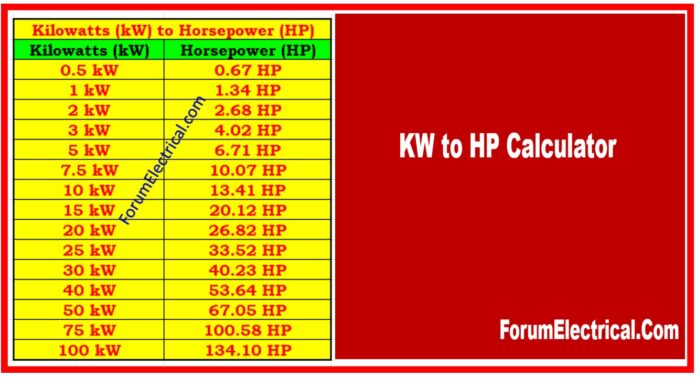Calculator
Click here for more Electrical Calculators
Kilowatts (KW)
Kilowatts (KW) are units of power in International System of Units (SI). The kilowatt’s base unit is the watt, named for Scottish inventor James Watt.
As with SI units, the prefix kilo- indicates that a kilowatt equals 1000 watts (or) 1000 joules per second.
1 KW = 1000 Watts (or) 1000 Joules/sec
The kilowatt’s basis unit is the watt, which became known after Scottish inventor James Watt.
He described the unit under the system of units in use at the time.
Kilowatts are now widely used around the world to describe engine output power as well as the energy generated by electric motors, tools, machinery, and heaters.
A house’s electricity use is usually expressed in kilowatt hours, (or) kWh, which equals 1000 watts applied during a single hour.
Megawatt (or) gigawatt hours can be employed in larger structures or for industrial purposes.
Horsepower (HP)
Horsepower (HP) is a unit of measurement for power (rate of work). Mechanical horsepower, commonly known as imperial horsepower, is roughly 745.7 watts (550 ft·lbf/s), and
metric horsepower corresponds to 735.5 watts (75 kgf·m/s).
Boiler horsepower, a less frequent measurement than imperial or metric horsepower, is used to grade steam boilers and equals 34.5 pounds of water evaporated every hour at 212 degrees Fahrenheit, (or) 9809.5 watts.
Furthermore, when rating electric motors, 1 horsepower equals 746 watts.
1 HP = 746 watts
How to convert kW to HP?
To convert kW to HP, multiply the power value by 1.34102.
Ex: If an engine produces 75 kW, the corresponding horsepower is approximately 100.5765 HP.
How many kW in 1 HP?
1 HP is approximately 0.7457 kW. This means that one horsepower equals 0.7457 kilowatts.
1 HP = 745.7 watts (or) 746 watts
1 HP = 0.7457 kW (or) 0.746 kW
kW to HP Formula
The formula for converting kW to HP is:
HP = kW x 1.3410
Solved Example
If an electric motor produces 10 kW, its corresponding power in horsepower is the following:
HP = 10 x 1.3410 = 13.410
Kilowatts to Horsepower Conversion Chart
KW to HP Conversion Chart
These are the complete conversions from kilowatts to horsepower.
| Kilowatts (KW) | Horsepower (HP) |
| 0.5 kW | 0.67 HP |
| 1 KW | 1.34 HP |
| 2 KW | 2.68 HP |
| 3 KW | 4.02 HP |
| 4 KW | 5.36 HP |
| 5 KW | 6.71 HP |
| 6 KW | 8.05 HP |
| 7 KW | 9.39 HP |
| 8 KW | 10.73 HP |
| 9 KW | 12.07 HP |
| 10 KW | 13.41 HP |
| 15 KW | 20.12 HP |
| 20 KW | 26.82 HP |
| 25 KW | 33.53 HP |
| 30 KW | 40.23 HP |
| 35 KW | 46.94 HP |
| 40 KW | 53.64 HP |
| 45 KW | 60.35 HP |
| 50 KW | 67.05 HP |
| 55 KW | 73.76 HP |
| 60 KW | 80.46 HP |
| 65 KW | 87.17 HP |
| 70 KW | 93.87 HP |
| 75 KW | 100.58 HP |
| 80 KW | 107.28 HP |
| 85 KW | 113.99 HP |
| 90 KW | 120.69 HP |
| 95 KW | 127.40 HP |
| 100 KW | 134.10 HP |
| 110 KW | 147.51 HP |
| 120 KW | 160.92 HP |
| 130 KW | 174.33 HP |
| 140 KW | 187.74 HP |
| 150 KW | 201.15 HP |
| 160 KW | 214.56 HP |
| 170 KW | 227.97 HP |
| 180 KW | 241.38 HP |
| 190 KW | 254.79 HP |
| 200 KW | 268.20 HP |
| 210 KW | 281.61 HP |
| 220 KW | 295.02 HP |
| 230 KW | 308.43 HP |
| 240 KW | 321.84 HP |
| 250 KW | 335.26 HP |
| 1000 kW | 1359.62 HP |
Why is kW to HP essential for Electricians?
Accurate Sizing
Recognizing the conversion allows for the proper selection of motors, drives, & systems for specific activities.
Efficiency
Selecting the appropriate power rating improves energy efficiency and reduces costs.
Safety
Incorrect power ratings can cause equipment failure and pose major safety hazards.
Electricians, Engineers, & Installers
Understanding power ratings is more than just numbers; it is about assuring safety & efficiency in all installations. Let us continue to increase awareness while working.









